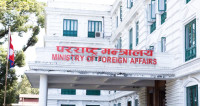National
Efforts on to criminalise loan sharking
Six months after the government’s last commitment, a fresh promise is made to take action against loan sharks and ease the woes of their victims.
Prithvi Man Shrestha
The government said that it has begun preparations to introduce a law to address the concerns of the loan shark victims who organised a protest march in front of Kathmandu’s Khula Manch on Monday. The victims, who are from various districts of the Tarai, had arrived in the Capital on Sunday after travelling for 11 days on foot.
The protestors marched in front of the Khula Manch demanding legal actions against loan sharks. They also asked the government to provide them loans at lower interest rates, bring laws against unscrupulous lending and scrapping of personal mortgaging contracts known as Tamasuk.
Although they tried to enter the Khula Manch, police deployed by the Kathmandu Metropolitan City stopped them, leading to a scuffle.
The protestors returned to Kathmandu six months after signing a five-point agreement with the government in September last year after which they had ended their protest. The government said it is now in the process of introducing the law that would criminalise loan sharking.
“We are at an initial stage of drafting a law criminalising loan sharking in coordination with the home ministry,” said Phanindra Gautam, joint secretary at the Ministry of Law, Justice and Parliamentary Affairs. “We are discussing the possibility of listing loan sharking in the criminal code.”
Once it is categorised as a criminal offence, the state will register a case and conduct legal fights against loan sharks.
Currently, loan sharking is essentially categorised as an offence under the civil code though acts such as blackmailing, extortion and other exploitations fall under criminal offences. In this condition, the victims have to fight the deep-pocketed loan sharks alone.
According to a report prepared by a task force formed by the government last year to curb unscrupulous lending, the loan sharks tend to file court cases based on the documents borrowers signed on terms dictated by loan sharks.
The loan sharks were found to have registered cases against the victims to recover their loans while the victims were often denied access to the court process.
Even though the state has guaranteed people’s access to legal services for free by introducing a law, the loan shark victims are unaware of such provisions, according to the report.
Given this context, the Home Ministry had suggested bringing the practice of loan sharking under the criminal code. “We have sent our recommendations to the Law Ministry that Criminal Code (Act) 2017 should be amended in order to bring the practice of loan sharking under the criminal code,” said Rudradevi Sharma, joint secretary at the planning, monitoring and evaluation at the Home Ministry. “If we do so, the state will take responsibility for the legal fight against the loan sharks.”
She said that it has been difficult for the victims to launch such legal fights as they have to fight individually without adequate legal support as they cannot hire good lawyers. The task force's report had also pointed out the provision of the National Civil Code (Act)-2017 that allowed people to file cases at the court directly on disputes over monetary exchanges (lenden) was only suitable for educated people or those who had sound legal knowledge.
It is not suitable for the uneducated and those having no proper legal knowledge because the loan sharks prepare documents stipulating loan amounts that are higher than the actual loans, and they also take lands as collateral like banks and financial institutions, according to the report.
The report has called for legal action against loan sharks who prepare multiple versions of their transactions and charge higher than reasonable interest rates.
According to the task force's report, other factors also made the legal fight against loan sharks challenging for the victims.
The victims signing documents prepared by loan sharks; victims putting up lands as collateral or transferring their ownership in the name of loan sharks to get a loan; the lender not giving receipt of loans that had been paid back; the victims’ fear of court procedures; weak defence by victims in the court on the accusations made by the loan sharks; and the proxies of the loan sharks accepting to buy collateralised lands while the lands are auctioned off—they are all challenges against ensuring justice for the victims.
Gautam of the law ministry, however, said that even though bringing loan sharking under the criminal code was a necessity, it was also important to ensure normal civil financial transactions are not treated as criminal offences.
“The state needs to take a balanced approach so that borrowers also would not bargain with the lenders by threatening to file a case under criminal offence even in the case of normal civil financial transactions,” he said. “The long-term implications of any legal provision must be factored in.”
The government has taken this initiative after the victims launched another protest stating that the government failed to implement the five-point agreement reached with them in September last year.
The two sides had agreed to probe the properties of the loan sharks, and the government has also pledged to make arrangements to compensate the victims who died from the torture meted out by the lenders.
If it is proven that the mortgaged land of the victims was captured by loan sharks even after the victims paid back the loan along with interest, a legal mechanism would be set up to take back the land, as per the agreement. The government had also agreed to fulfil the victims’ other demands through a Cabinet decision by coordinating with other authorities, as recommended by the task force.

Sharma, the joint secretary at the Home Ministry, said that the government continues to get complaints against loan sharks.
According to her, the District Administration Offices (DAOs) of 35 districts have so far received 3,351 complaints against loan sharks. Of them, the DAOs have cleared 346 complaints. As many as 774 are under discussions at the DAOs, 525 complaints are under the jurisdiction of the courts, the police are dealing with 850 complaints while no action has been taken on the remaining 1,181 complaints.
After the victims launched another round of protests, the Home Ministry on Friday issued a circular in the name of DAOs to deal with the complaints against loan sharks. According to Sharma, the DAOs were told to give priority to such complaints, continue to receive the complaints and help victims to gather evidence against loan sharks.
Experts say a real solution to this problem will emerge only when the reasons behind the public’s overreliance on loan sharks is properly understood.
According to the task force’s report, victims took out loans in order to meet their urgent monetary needs for they lacked properties that could be converted into cash immediately or did not have collateral acceptable for banks and financial institutions.
Nara Bahadur Thapa, former executive director of Nepal Rastra Bank, said easing poor people’s access to finance and providing easier legal options for loan shark victims would help resolve the problem to a large extent.
“As microfinance institutions that were supposed to ease financial access to the poor have also been blamed for charging exorbitant interest rates, time has come to rethink the functioning modality of these microfinance institutions as well,” he said.
The story has been updated for clarity.




 9.72°C Kathmandu
9.72°C Kathmandu















